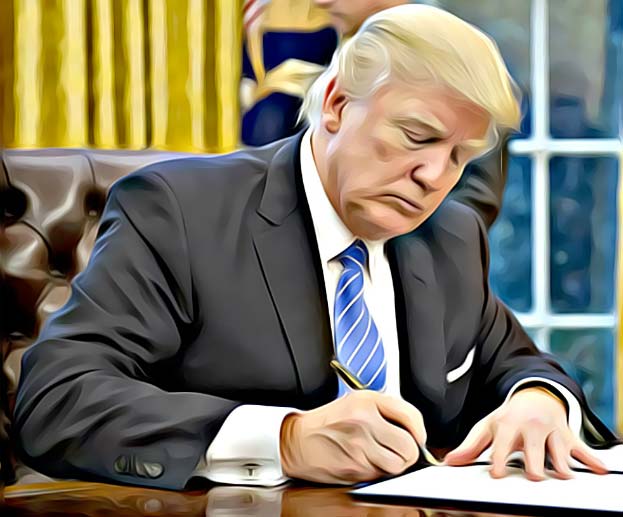
All of a sudden, we're all originalists and believers in the sagacity and inviolate handiwork of long-ago white males.
President Donald Trump's trial balloon about changing birthright citizenship via executive order has brought a hail of denunciations. He wants, the critics say, to change the Constitution under his own power, in the service of the allegedly racist goal of excluding the children of undocumented immigrants from U.S. citizenship.
Contrary to the chest-beating, there's a serious case that the 14th Amendment, which grants citizenship to anyone born here who is "subject to the jurisdiction" of the United States, is ambiguous on whether the provision applies to undocumented immigrants. And, as a policy, nearly unlimited birthright citizenship has obvious downsides. But the executive order the president is contemplating is a bad idea and should go in whatever circular filing cabinet is reserved for misbegotten inspirations that he's eventually talked out of.
The argument about the 14th Amendment is whether it, with the exception of diplomats and foreign armies, is meant to give citizenship to the children of anyone here, or whether it requires some deeper allegiance to the United States. The case for the latter, more limited interpretation has some formidable advocates, but the expansive view has more supporters and also long-standing practice on its side.
It'd certainly be instructive to have the Supreme Court weigh in, since the question of illegal immigrants hasn't been directly addressed by the courts and no one who debated and adopted the 14th Amendment contemplated a large-scale influx of undocumented immigrants, or the rise of birth tourism.
Undocumented immigrants, of course, come here in open defiance of our laws and stay by continually violating our laws. They are subject to our jurisdiction, but do everything they can to evade it, and aren't fully subject to it — it wouldn't make any sense, for instance, to try an undocumented immigrant for treason. As a policy matter, it is perverse that undocumented immigrants win one of the world's great lotteries through their lawbreaking, by getting citizenship for their children. This makes it more difficult for us to enforce our laws, both because it serves as a magnet to come to the United States and an impediment to removing undocumented immigrants once they are here.
So it's understandable that Trump opposes the status quo, and is frustrated by it. But that doesn't mean he should issue an executive order.
Despite the cottage industry of analysis of him as a budding Hitler, Trump has so far avoided the unilateral excesses of President Barack Obama. Given the relative lack of major congressional legislation, the focus has been almost entirely on the executive: on his words, his tariffs, his foreign policy, and yes, his executive orders and regulations. By and large, though, those have been devoted to reversing Obama's executive orders and regulations. It's been a tit-for-tat unilateralism (the most famous exception was the travel ban, which was obviously within the president's authority and ultimately upheld by the Supreme Court).
This would be different. Even if the interpretation that the 14th Amendment doesn't mandate birthright citizenship for undocumented immigrants is correct, there's another obstacle in Trump's way. Congress has legislated in this area and codified the language of the 14th Amendment. It hasn't acted to change the interpretation of birthright citizenship, even though it had ample opportunity to do so across the decades. (An effort spearheaded by Harry Reid in the 1990s never went anywhere.)
So if Trump wants to test the limits of birthright citizenship, he really needs Congress to move, which it won't. Even if it were in Trump's power to make this change on his own, it would be poor practice to make such a sweeping revision in a policy that is taken by many to be core to the nation's identity without the buy-in of the legislative branch.
Desperation to change the rules on immigration even though Congress wouldn't act is what made Obama rewrite the immigration laws on his own. Trump should resist the same temptation.
Regardless, if the president goes down this route, he will likely get swamped in the courts. There would be an immediate injunction. A case might not even make it to the Supreme Court, and the courts wouldn't even have to speak to the underlying issue of birthright citizenship — they could just rule that the executive order exceeds the president's authority.
Even such a limited decision would be widely interpreted as an affirmation of the current interpretation of the 14th Amendment, setting back the cause of changing birthright citizenship, rather than advancing it.
The best way to combat illegal immigration is an E-Verify system that requires employers to ascertain whether their employees are legal. It doesn't have the emotive power of Trump's other emphases on immigration — the wall, tent cities and troops at the border, and now this — but it is more achievable and would be more effective.
(COMMENT, BELOW)


 Contact The Editor
Contact The Editor
 Articles By This Author
Articles By This Author